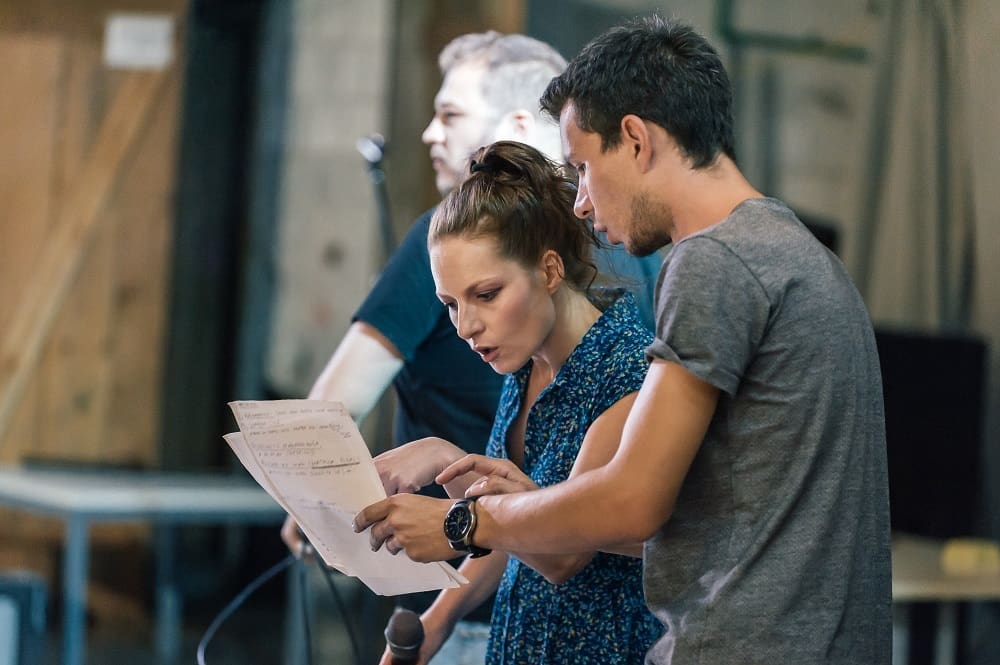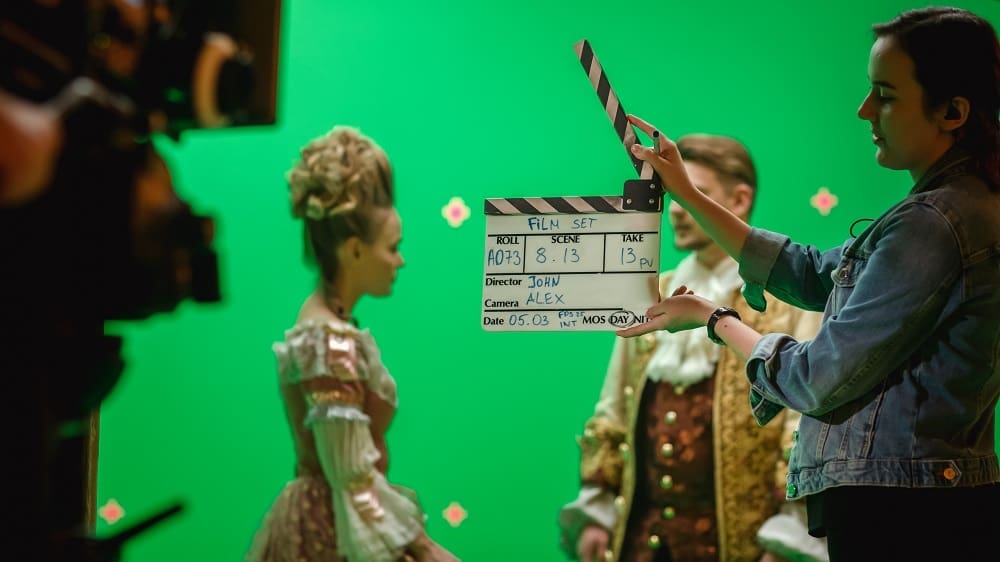In this Actor Career Guide
What Does An Actor Do?
An actor is sometimes also known as an artist, character, entertainer, performer or extra. They bring characters’ stories and situations to life using speech, movement, expression or body language and can work in film, television, theatre or radio. They can work from scripts or improvise.
Actors can specialise in various types of acting, such as advertising, film or TV roles, live stage performances, soap operas, radio work, voice acting, etc. They can play fictional or factual characters in various-sized parts and can also be extras. Therefore, what actors do will depend on their specialisms, role and where they work.
An actor’s main aim is to play a character convincingly to engage viewers and make them believe the story they are telling. For a production to be successful, it must attract and keep viewers; actors have an essential role in this success. An actor also wants to become well-known to ensure they receive continued acting roles.
An actor will carry out many tasks, including liaising with an agent, preparing for and going to auditions, researching roles, learning lines, rehearsing, attending costume fittings, performing, supporting backstage activities, etc. The job may also include recordkeeping for self-employment purposes.
Actors will work with many people, such as directors, assistant directors, other actors, production staff and crew, their agents, backstage staff, make-up artists, camera operators, coaches, etc. They will also liaise with external stakeholders, such as the media, venue managers and accommodation providers.
Actors can work in various settings, such as indoor film or TV sets, theatres and recording studios. They may also work outdoors in all weather. They are usually self-employed or freelance. However, there may be some employed roles. They can work for different-sized companies, from large productions to smaller production firms.

Responsibilities
An actor’s responsibilities will depend on many factors, including who they work for, the type of acting they specialise in and the industry in which they work.
Some examples of their day-to-day duties may include (this list is not exhaustive):
- Liaising with directors, crew, cast members, venue managers and accommodation providers.
- Looking for jobs and networking.
- Meeting and liaising with an agent, e.g. to discuss potential opportunities and roles.
- Preparing for and going to auditions.
- Researching roles.
- Preparing for parts.
- Learning lines and rehearsing after securing parts.
- Attending costume fittings.
- Supporting backstage activities, e.g. performance area, props or costumes.
- Performing, e.g. in a studio (TV, film or radio), on location or for a live audience.
- Doing extra or walk-on work for film or TV.
- Recording voice-overs.
- Keeping records.
Working Hours
An actor’s working hours are variable and will depend on their specialisms. However, it is not a 9-5 job, and those looking at entering this profession may have to work irregular, long and unsociable hours. Early mornings, evenings, weekends and bank holidays are typical for those working in TV and film.
There are different acting roles, so there may be some flexibility, especially with pre-recorded shows. Some employers may offer flexible working options, such as part-time, hybrid, job share and remote. However, most roles are on a fixed-term or freelance contract basis.
Many actors will have other employment or several roles at once, as jobs can be short term. However, some actors find long-term opportunities, e.g. in soap operas and with touring theatre companies.
The role will usually involve travel, i.e. local, regional or national, depending on where an actor is based, e.g. in studios or on location, or if they have to tour. Working away from home may be necessary, and overseas travel may be required.

What to Expect
There are many positives to being an actor, especially if individuals are artistic, extroverted, confident and like performing in front of the camera and/or a live audience. Being an actor also allows individuals to play different characters, be creative, do stunts, work with other actors and express a range of emotions.
This job would suit those looking for more than a 9-5 office job, as it offers unique work environments. Actors can work in theatres, studios, TV and film sets or on location. For some roles, there may be opportunities to travel and work overseas and work in historical and unusual places.
It can be a rewarding career choice and can be exciting winning roles, getting positive feedback from audiences and seeing them engaged with the performance. If an actor is successful, there is significant earning potential and recognition.
Boredom will never be a problem for actors, as their work can be varied. There are also plenty of opportunities to specialise. Actors can work in film, TV, theatre or on the radio. They may choose dramatic acting, voice-over acting, advertisements, comedic acting, etc.
Even though there are positives to being an actor, there are challenges and cons, e.g.:
- Lack of job security – being an actor means there is not the level of job security you would find in other roles. Actors usually have to line up more work and win parts by auditioning. Directors may have specific requirements for some parts, so actors sometimes find it difficult to get work. Most individuals work other jobs in between acting.
- Low starting pay – not all actors earn millions; most earn very little, especially in the beginning. Individuals can find it tricky to get parts, especially those new to the profession. Individuals will need to be determined and persistent to succeed in this career.
- Unsociable, long and irregular working hours – most actors will need to work long and unsociable hours, depending on their part, contract and location. They will usually be required to spend considerable time away from home, which can disrupt an individual’s home and social life.
- Physical and mental demands – being an actor can be physically demanding. Some roles require a certain fitness level, as actors may need to run, swim, be on their feet all day or use their strength for various activities. It can also be mentally demanding, e.g. learning and remembering lines and working long days.
- Lack of privacy – with more fame comes less privacy. As actors become more famous, they typically have more media coverage, and people want to see and meet them. It can be intrusive, and not all attention will be positive. Individuals in the public eye must be able to cope with criticism.
Every career choice has pros and cons, and individuals must know what to expect before deciding whether it is for them. The starting pay is usually low, there is a lack of job security, and it can be physically and mentally demanding. However, there are many positives too, and those who become actors enjoy performing for others and the opportunities it can bring.
When considering whether to be an actor and the type of role, individuals should look at the pros and cons. They should also ensure they have the right personal qualities to carry out the role and responsibilities required.
Personal Qualities Needed To Be an Actor
Some of the personal qualities an actor requires will include (this list is not exhaustive):
- Knowledge of fine arts, acting and performing.
- Knowledge of media production and communication.
- Knowledge of the English language or other languages where required.
- A passion for storytelling and pretending to be different characters.
- Enjoys working with people.
- Assertive, confident, self-disciplined, responsible and has initiative.
- Tenacious, determined, persistent, resilient and motivated.
- Approachable, honest, trustworthy, ethical and professional.
- Punctual and reliable.
- Creative thinking.
- Stamina to work long hours.
- Excellent communication skills, both verbal and written.
- Active listening skills.
- Interpretation and analysing skills.
- Being thorough, accurate and having attention to detail.
- The ability to learn and memorise lines.
- The ability to work well with others.
- The ability to take instruction.
- The ability to take criticism.
- The ability to work well under pressure and remain confident and calm in stressful situations.
- The ability to be flexible and adapt to change.
- The ability to work to tight deadlines and meet targets.
- The ability to use IT equipment, e.g. computers and hand-held devices, and relevant software packages.
Having additional skills can also go a long way, for example:
- Improvisation.
- Singing.
- Dancing.
- Playing musical instruments.
- Languages.
- Stunts.
Qualifications and Training
Qualifications
There are many routes to becoming an actor. Individuals could attend university or college, enrol on a private training course or apply directly. They could also do work experience to help them enter the role.
University
An individual does not need a degree to become an actor. However, having a foundation, undergraduate or postgraduate degree can help individuals stand out, especially as it can be a competitive industry.
The degree topic needed will depend on the acting an individual wants to do and the industry.
Some examples of degree topics that may be helpful are as follows (this list is not exhaustive):
- Performance studies.
- Drama.
- Acting.
- Musical theatre.
- Contemporary theatre and performance.
- Communication and media studies.
- Drama, theatre and acting.
- Performance for screen.
The entry requirements and the number of UCAS points needed will depend on each university, and individuals should check before applying.
They will typically require the following:
- A minimum of 1 A Level for a foundation degree.
- 2 or 3 good A Levels for an undergraduate degree.
- 2:1 or 2:2 relevant undergraduate degree subject for a postgraduate degree.
Some institutions also invite applicants for an audition as part of the selection process.
College/private training
College courses
Undertaking a college course can help individuals become actors if they do not want to do a degree course.
Some examples of courses that may be useful are as follows (this list is not exhaustive):
- Level 2 Certificate in Performing Arts.
- Level 2 Diploma in Performing and Production Arts.
- Level 3 Drama Diploma.
- Level 3 UAL Extended Diploma in Acting.
- Level 4 Diploma in Speech and Drama.
- A Level in Drama and Theatre.
- A Level in Media Studies.
Individuals usually need:
- Level 2 – two or more GCSEs grades 9 to 3 (A* to D) or equivalent.
- Level 3/A Levels – five GCSEs grades 9 to 4 (A* to C) or equivalent.
- Level 4 – one or more A Levels, a level 3 Diploma or relevant experience.
Private training
An alternative to college is specialist drama, dance, performing arts and acting schools. They offer various study modes, such as full-time, part-time and summer school.
Most schools want individuals to have some qualifications, such as a Level 3 Diploma in Performing Arts or A Levels. Some will accept individuals without qualifications if they have the right talent, enthusiasm and commitment. Most schools will require an audition as part of the application process.
The subjects offered, course length, study mode and entry requirements will depend on each school. Fees for schools can also vary significantly, but funding is available for those eligible.
There are also acting academies that allow individuals to test their acting skills, for example, the London Academy of Music & Dramatic Art (LAMDA).
It may also be worth enrolling on low-cost online short performing arts, drama or voice acting courses to see if a career as an actor is of interest. That way, if not, it will save an individual a lot of time and trouble. Even short community courses can count.
Taking courses and qualifications does not guarantee success. However, it will demonstrate to directors and production staff that they are keen on the industry and may give individuals a competitive edge. Always check the entry requirements before applying.
Applying directly
There may be opportunities for individuals to apply directly for roles, but they will usually need to be experienced and extremely talented.

Work Experience
Some companies may decide to take on individuals as interns and train them if they have the necessary personal qualities and enthusiasm for the role, e.g. BBC Careers Work Experience Scheme. It would help individuals to have previous experience in performing arts. However, the requirements will depend on each company. Job sites will usually advertise opportunities.
Individuals could also get experience by doing the following (this list is not exhaustive):
- Joining a school, college, university, youth or community amateur dramatics group or society.
- Gaining work experience at a theatre, film/TV studio or radio station.
- Signing up to an agency and working as an extra on TV/film shows or in small parts, such as adverts.
- Working as an entertainer or tour operator at holiday resorts, theme parks and camps.
Volunteering can also help people gain valuable experience. Individuals could volunteer with charities, i.e. providing entertainment to the elderly or infirm or working in media. There is information on volunteering and local opportunities on Do-IT, NCVO and Volunteering Matters.
Individuals will need to undertake lots of relevant acting experience to develop their skills, as there is a lot of competition in acting.

Training Course
Learning does not stop with experience or once someone becomes qualified. Attending relevant training courses and having additional certifications can help individuals enter the profession, enhance their employability and give them a competitive edge. Many colleges and accredited private training companies can provide relevant training courses.
Some examples of courses that may be useful for individuals looking at a career in acting include (this list is not exhaustive):
- Equality and diversity.
- LGBTQ+ awareness.
- Work-related stress.
- Conflict management.
- Data protection and the GDPR.
- Customer service skills.
- Time management skills.
- Resilience training.
- Business management.
- Marketing.
- Social media.
There are also courses in specific areas of acting, for example:
- Screen acting.
- Accent training.
- Audition techniques.
- Playing Shakespeare.
- Voice acting.
- Voice-over training.
- Beginner’s acting.
- Improver’s acting.
- Advanced acting.
- Improvisation.
- Classical acting.
Professional bodies, not-for-profit companies, charities and trade unions, such as Equity, the Actors’ Guild of Great Britain, BAFTA, Women in Film and TV, ScreenSkills, International Federation of Actors, UK Theatre and others, can also advise on reputable training courses. Some also provide memberships, events and support to help individuals become actors giving them the means to continue their professional development.
The type of training required will depend on who an individual works for and their specialisms. It is worth looking at several job advertisements to identify the training needed for parts. Jobs are on websites such as GOV.UK find a job service, Indeed, LinkedIn, Glassdoor, Backstage, The Stage, Mandy Actors, Casting Now, StarNow, The Knowledge, and many other sites. Also, look at agencies, e.g. Uni-versal Extras
More relevant training and competence (skills, experience, talent and knowledge) will open up more opportunities for individuals. Refresher training is also advisable as it keeps your knowledge and skills up to date.
Being self-employed
Most actors are self-employed, and there are additional responsibilities to be aware of.
Anyone self-employed will need to:
- Have the correct insurance, i.e. public liability, professional indemnity and business.
- Register with HMRC.
- File tax returns.
- Pay tax and National Insurance contributions.
Further advice and guidance on being self-employed can be found on GOV.UK.
Criminal records checks
Some actors may need to undergo a criminal record check. A criminal record, caution, warning, or conviction may put off prospective employers. However, they should account for the seriousness of the crime, when it occurred and its relevance to the role.
The organisation that holds criminal records will depend on the country within the UK, for example:
- England and Wales – Disclosure and Barring Service (DBS).
- Northern Ireland – AccessNI.
- Scotland – Protecting Vulnerable Groups (PVG) scheme.
Other considerations
To stand out from the crowd, actors should also have a:
- CV – a professional CV should be clear and concise and detail relevant experience, training, specialist skills and recommendations.
- Headshot – good quality head and shoulder photos are essential, as they are what casting directors see first.
- Showreel – a short video that showcases what an individual has to offer.
- Presence online – having a professional social media presence or website can illustrate how individuals engage with the public.
Most actors are freelance and use agents who put them forward for castings and auditions. It is important to note that agents take a fee of an individual’s earnings, usually 10-25%. Securing an agent is competitive, so individuals must be prepared to showcase themselves.

Where Do Actors Work?
Actors can work in various settings, depending on the type of production in which they are involved.
Some examples of places where they can work include (this list is not exhaustive):
- Theatres.
- TV and film sets.
- Production studios.
- On location, e.g. outdoors, historical buildings and transport.
- Radio stations.
- Church halls.
- Community centres.
- Public gardens.
- Theme parks and resorts.
- Festivals.
- Schools, colleges and universities.
- At home, i.e. for internet-based roles.
They can work for various companies, such as:
- Repertory companies, i.e. seasonal employment.
- Commercial theatre companies, e.g. London’s West End.
- Small theatre companies, e.g. fringe.
- Film, television or radio companies.
- Museums, heritage organisations, attraction operators and tour companies.
Actors can also be self-employed, freelance or work for talent agencies.
Some actors may also travel during their working day, which may involve some overnight stays. There may be opportunities for overseas travel and stays with certain roles.
Most auditions are in major cities, such as London, Manchester and Birmingham.

How Much Do Actors Earn?
What an actor earns is highly variable. Equity, the trade union, negotiates minimum wages for actors.
An actor’s salary will depend on whether they are employed, self-employed or freelance. Their working hours, experience, location, talent, specialisms, number of performances and whether they have an agent will also influence their earnings.
According to Check-a-Salary (these figures are a guide only):
- Actors, on average, earn a minimum of £19,200.00.
- The average actor’s salary in the UK is £26,442.41.
- Actors, on average, earn a maximum of £61,322.00.
Many actors will not become wealthy from the profession. However, the potential to earn significantly is there for some individuals. Some will have to find other ways to make money due to the lack of job security with acting.
Self-employed actors must factor in various expenses when considering the salary, e.g. tax, National Insurance, travel, other insurances (business/liability), agent fees, photos, qualifications and training, etc.

Types of Acting Roles To Specialise In
There are different types of acting in which individuals can specialise, for example (this list is not exhaustive):
- Voice – performing voice-overs off-screen/stage for various productions, e.g. animations, advertisements, video games, documentaries, audiobooks, films and TV shows.
- Film and TV – working in studios, sets or on location for small to large TV or film productions. Competition is fierce for these types of roles.
- Theatre – performing on stage to a live audience from small fringe theatres to London’s West End.
- Radio – acting on radio stations, e.g. soap operas, such as BBC Radio 4’s The Archers.
- Extras – performing a non-speaking role in a scene’s background. They are also known as background actors.
- Advertisements – acting in short adverts on TV, social media and other online platforms.
- Theme parks and attractions – playing different characters and performing and interacting with the public. Many celebrities started their careers at Disney theme parks.
There are also different acting methods in which individuals can specialise, e.g. comedic and classical.
All specialist acting roles require differing knowledge, skills, experience and qualities. All actors will need to be confident, talented and possess a passion for storytelling. Any additional areas of expertise will depend on what production staff/a director wants in an actor and an actor’s intended specialist areas. Further qualifications and training may be necessary for specialised roles.
Actors not competently carrying out their roles can result in poor audience reviews, which can negatively impact a production. Actors can also be widely criticised in the media and may lose out on future work. Therefore, whatever the type of role, actors must have the necessary competence to carry out their jobs professionally.

Professional Bodies
Productions, audiences, trends and technologies are regularly changing. Therefore, actors must keep ahead of the latest developments and changes to ensure they carry out their roles professionally to be successful. Continuing professional development (CPD) gives actors the knowledge and skills to keep up to date with these changes and progress in their careers.
Joining a professional body can help prospective and current actors enhance their skills and overall career. These may offer different levels of membership, CPD, support and access to industry contacts and networking events.
There may be opportunities for career progression for actors. With more qualifications, talent, skills and experience, they can move between TV, film, radio and theatre roles or choose to specialise in one area. However, there are no guarantees, and actors must prepare for the ups and downs of this job.
Knowledge, skills and experience gained from being an actor can also lead to a career in different areas. For example, they could become a director, theatre manager, scriptwriter or drama therapist. There may also be opportunities in education to train future actors in drama and acting schools.

















